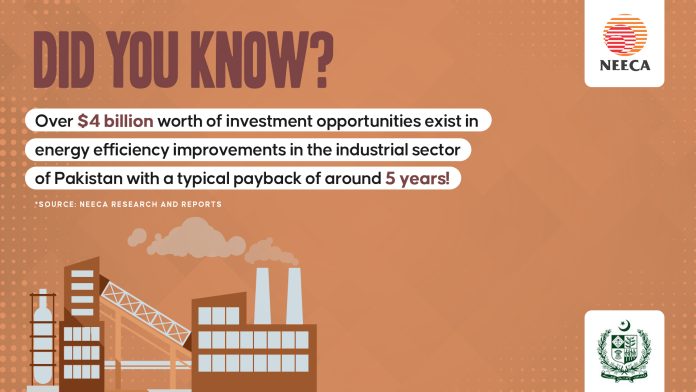The industrial sector, being the largest consumer of energy, presents a lucrative landscape for businesses to enhance their competitiveness, reduce costs, and tap into the global demand for competitive industrial products.
This article will discuss the challenges faced by the industrial sector, highlight NEECA’s strategic interventions, and emphasize the immense economic potential for businesses to capitalize on energy efficiency improvements.
Challenges and Opportunities in the Industrial Sector
Pakistan’s industrial sector accounts for a significant share of energy use, but it also holds great untapped potential for energy savings and economic growth. According to the Planning Commission of Pakistan, the total energy saving potential in the industrial sector is estimated to be a staggering 39%.
By embracing energy efficiency improvements, businesses can seize lucrative growth opportunities. The textile sector, accounting for a substantial portion of electricity and
natural gas consumption, offers the highest efficiency gains with a potential energy saving of 2,150 GWh.
Similarly, the cement sector, steel sector, and sugar mills have significant energy saving potential. By adopting energy-efficient practices, businesses in these sectors can improve their operational efficiency, reduce costs, and gain a competitive edge.
NEECA’s Strategic Interventions: Driving Economic Growth through Energy Efficiency
NEECA has introduced a range of strategic interventions designed to catalyze economic growth and enhance the competitiveness of Pakistan’s industrial sector through energy efficiency improvements. By capitalizing on these interventions, businesses can tap into investment opportunities, boost
productivity, and position themselves as leaders in efficient industrial practices.
NEECA has launched the Minimum Energy Performance Standards (MEPS) for large industrial motors leading to substantial electricity savings, cost reductions, peak load reduction, and CO2 emissions reduction. This presents
an opportunity for businesses to upgrade their motor systems to more efficient alternatives. This transition not only enhances energy efficiency but also reduces operational costs and boosts productivity. In addition, NEECA aims to launch the industrial boiler tune-ups, retrofitting, and replacement programme to improve energy efficiency. By replacing inefficient boilers and
implementing tune-up programs, significant energy savings can be achieved.
Furthermore, NEECA’s emphasis on mandatory energy audits, energy management systems, and the deployment of energy managers enables businesses to identify and implement energy-saving measures with a verifiable five-year energy saving plan. These interventions not only optimize
energy consumption but also drive cost savings and improve the overall performance of industrial operations.
Unlocking Economic Potential
By embracing energy efficiency improvements, businesses in Pakistan’s industrial sector can unlock tremendous economic potential. The estimated $4 billion investment opportunities in energy efficiency improvements, with a typical payback period of around five years, provide an attractive proposition
for businesses seeking efficient growth and improved profitability.
Moreover, energy efficiency measures can enhance export competitiveness by making export-oriented industries more productive and aligning with international demand for efficient products. With international markets adopting trade tools aimed at reducing greenhouse gas emissions, businesses that prioritize energy efficiency will be well-positioned to access
these markets and gain a competitive advantage.
Seize the Opportunity
The time is ripe for businesses in Pakistan’s industrial sector to seize the immense growth opportunities presented by energy efficiency. By partnering with NEECA and embracing energy-efficient practices, businesses can enhance their competitiveness, reduce costs, and position themselves as
pioneers in efficient industrial practices. Embrace Energy Management Systems (EnMS), conduct energy audits, retrofit inefficient systems, and upgrade to more efficient technologies. By capitalizing on the immense economic potential of energy efficiency, businesses can drive growth, and contribute to Pakistan’s economic prosperity.
Join NEECA in this opportunistic journey towards unlocking economic potential through energy efficiency in Pakistan’s industrial sector. Together, let’s forge a path to energy-smart growth, improved competitiveness, and a thriving industrial landscape.


